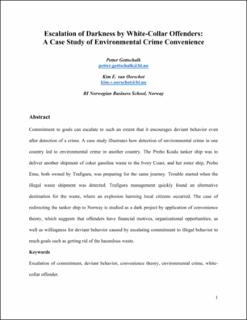Escalation Of Darkness By White-Collar Offenders: A Case Study Of Environmental Crime Convenience
Peer reviewed, Journal article
Accepted version
Permanent lenke
https://hdl.handle.net/11250/3092626Utgivelsesdato
2021Metadata
Vis full innførselSamlinger
- Scientific articles [2181]
Originalversjon
Journal of International Doctoral Research. 2021, 8 (1), 178-204.Sammendrag
Commitment to goals can escalate to such an extent that it encourages deviant behaviour even after detection of a crime. A case study illustrates how detection of environmental crime in one country led to environmental crime in another country. The Probo Koala tanker ship was to deliver another shipment of coker gasoline waste to the Ivory Coast, and her sister ship, Probo Emu, both owned by Trafigura, was preparing for the same journey. Trouble started when the illegal waste shipment was detected. Trafigura management quickly found an alternative destination for the waste, where an explosion harming local citizens occurred. The case of redirecting the tanker ship to Norway is studied as a dark project by application of convenience theory, which suggests that offenders have financial motives, organizational opportunities, as well as willingness for deviant behavior caused by escalating commitment to illegal behavior to reach goals such as getting rid of the hazardous waste.

